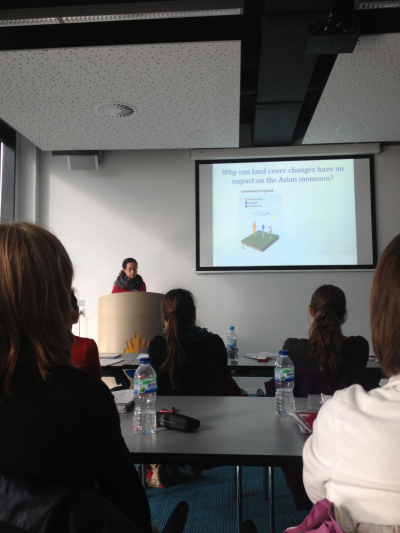Page path:
- Graduate School GLOMAR
- PhD student reports
- Other activities
- Astrid Contreras Rosales
Astrid Contreras Rosales
Report of GLOMAR PhD student Astrid Contreras Rosales about her participation in the PhD course on Molecular Organic Biogeochemistry organized by the Royal Netherlands Institute for Sea Research (NIOZ) Texel, Netherlands, 24 - 28 September 2012
Thanks to the financial support of GLOMAR, I was able to attend to this PhD course which is among the best available in the field of organic geochemistry. The course took place in the Royal Netherlands Institute for Sea Research (NIOZ), was organized by members of the Laboratory of Marine Organic Biogeochemistry, and the program was distributed within five working days of 8 hours. The total number of participants was 28 PhDs and 9 members of the research staff from the NIOZ organic geochemistry working group. The course program included theoretical lessons, practical exercises on data analysis and interpretation, and student short presentations (10 min.) about our own research topics and interests.
On the first day of the course, there was an introduction into the theoretical background of well-established and state-of-the-art analytical techniques in the field of organic geochemistry, including gas chromatography, mass spectrometry and liquid chromatography techniques. The second day was focused on the origin, molecular phylogeny, and biological precursors of biomarker molecules within the life domains, i.e. how these molecules are distributed within Eukaryota, Archaea and Bacteria. On the third day, we discussed the different compounds available to be used as organic proxies, and the degradation processes that affect them between the death of the producer organism and the final burial environment. The fourth day we were introduced to a new strategy recently developed by the NIOZ-organic geochemistry research group based on intact polar lipids, which attempts to “fingerprint” an entire living community by looking only at fresh lipids from recent environmental samples. Finally, on the last day, we discussed in detail about a state-of-the art method/proxy in the field of organic geochemistry; this is based on compound-specific stable isotope analysis and it has outmost importance for my own PhD project since they are one of the key proxies that I use during my research.
Overall, the course was also important from the social point of view since the friendly/relaxed atmosphere held on throughout increased the opportunities to exchange ideas with other people working in this field, including both high profile scientists and other PhD students.
On the first day of the course, there was an introduction into the theoretical background of well-established and state-of-the-art analytical techniques in the field of organic geochemistry, including gas chromatography, mass spectrometry and liquid chromatography techniques. The second day was focused on the origin, molecular phylogeny, and biological precursors of biomarker molecules within the life domains, i.e. how these molecules are distributed within Eukaryota, Archaea and Bacteria. On the third day, we discussed the different compounds available to be used as organic proxies, and the degradation processes that affect them between the death of the producer organism and the final burial environment. The fourth day we were introduced to a new strategy recently developed by the NIOZ-organic geochemistry research group based on intact polar lipids, which attempts to “fingerprint” an entire living community by looking only at fresh lipids from recent environmental samples. Finally, on the last day, we discussed in detail about a state-of-the art method/proxy in the field of organic geochemistry; this is based on compound-specific stable isotope analysis and it has outmost importance for my own PhD project since they are one of the key proxies that I use during my research.
Overall, the course was also important from the social point of view since the friendly/relaxed atmosphere held on throughout increased the opportunities to exchange ideas with other people working in this field, including both high profile scientists and other PhD students.



